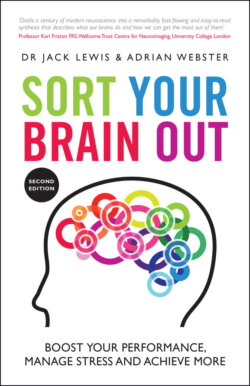Читать книгу Sort Your Brain Out - Джек Льюис, Адриан Вебстер - Страница 12
Old Dogs, New Tricks Rewiring needed
ОглавлениеNew skills don't come easy when first attempted but, with a bit of dedication, the early signs of improvement soon become apparent as we start to get into the swing of things. Eventually, what once felt completely alien becomes as easy as a walk in the park.
Why? Because your brain has invested sufficient resources into rewiring the pathways involved in executing that task. The key is not to lose faith when the early improvements start to taper off. Instead, you must keep pressing on. By doing so – and continuing to challenge your brain – it will continue to invest resources into improving communication between brain areas involved in whatever skill you are practising.
For most of us, this is easier said than done. As kids we were constantly confronted with having to try new things on a daily basis and thus struggling with new challenges was a normal, everyday experience. As adults, however, we are drawn by a natural instinct to seek comfort in behaviours that we know we are good at. As a result, we become less inclined to try new things that have the potential to make us feel like a failure. However, those who do trust their brains to adapt to any regularly encountered challenge and embrace the opportunity to try new things will inevitably continue to expand and develop their abilities.
As a child you were told by certain people who were most influential to you – parents, older relatives, teachers and peers – that you were good at some things and not so good at others. The themes that you regularly heard not only shaped your beliefs, but also profoundly influenced the environments and tasks that you chose to dedicate time to – the ones you became best adapted to – and the ones you tried to avoid.
If a teacher led you to believe that you were hopeless at maths, then a self‐fulfilling prophesy would be born. You would never again greet the prospect of having to do maths with any relish. This shortfall in enthusiasm would result in you not trying. The lack of effort would mean that your brain wouldn't really be stretched and so, as a direct consequence, it would be unable to adapt to improve your abilities. The inevitable poor results that followed would merely confirm your misplaced belief that you are “no good at maths.”
The exact opposite also applies, only this time in a self‐propelling, upwards direction. If you really believed – because a figure of authority convinced you of your “inherent” talent – that you were good at maths, then of course you would be inspired to do more maths. The consequence of your newfound dedication would mean your brain would be continuously challenged and, as a direct result, would be forced to adapt to do it faster, better and more efficiently each time. With your brain now having invested in some much‐needed rewiring, your maths skills would improve, bringing you closer to your true potential and, in turn, you'd be even more motivated to do more maths.
You can't teach an old dog new tricks, huh? Well, that may or may not be true, but it's totally irrelevant to us humans. We most definitely can learn new tricks throughout life. We just need to get into the habit of lifelong learning to keep the brain circuitry nice and malleable.
It is true that the brain is particularly adaptable during childhood and adolescence. Kids seem to absorb information like sponges, which can make us adults feel as though we have permanently lost our natural capacity to learn new tricks. This is completely untrue. We just don't acquire new skills as rapidly as younger brains do – largely a consequence of how much time we spend each day trying to pick up new skills. Children do it all the time, whereas we grown‐ups only do so much, and far less often. Herein lies a crucial difference that explains why, through practice, kids pick things up more quickly than adults: your brain learns to learn during childhood and gets better and better the more learning it does. Unfortunately, most adult brains have fallen out of the habit of learning because of the lack of demand placed on them to attempt new challenges every single day.
Challenge your brain regularly to learn and it will gradually reinvigorate the circuits that make learning happen rapidly. That's all there is to it.
